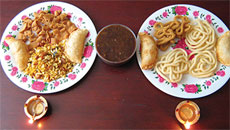In two earlier DARPAN articles, I wrote about cardiovascular disease and diabetes prevention and control. In this article, the focus is on prevention and control of hypertension. If you are puzzled about the word hypertension, you are not alone!
Hyper what?
You may have heard the term hypertension used. Do you know what it means? Put simply, hypertension means high blood pressure.
Blood vessels in the body, large and small, are either arteries or veins. Arteries deliver oxygen and nutrients to the cells of the body. Veins take blood back to be refilled with oxygen and nutrients. Blood pressure is the force of the blood in the arteries.
There are two numbers that you may hear, say 120 over 80, when your blood pressure is taken. The higher number is the force, or pressure, of blood in your arteries as your heart beats. The lower number is the left over force, or pressure, between heart beats.
The Pressure is On
Your blood pressure goes up or down depending on whether you are resting or active, relaxed or tense. Most of us are not aware when our blood pressure goes up or down.
Hypertension most often refers to longer term, or chronic, increases in the pressure of blood in the arteries. Hypertension may go unnoticed, because people may not feel any different when their blood pressure is up.
Think of your blood like fluid running through small fragile tubes. If the fluid is under too much pressure, the tubes can be damaged. Blood that is running through arteries, if under too much pressure, can damage the inside walls of the arteries. When damage occurs, and keeps occurring, the inside walls of the arteries change. Small scars can develop. This scarring is a place where fat, cholesterol (a special type of fat) and other matter tends to stick. When these substances, plus a few others, stick together on the inside walls of arteries it is called plaque.
Naturally, just like any tube with fluid running inside, if the space inside the tube is narrowed, the pressure builds up. So if there is plaque inside arteries, the space for the blood to run through is decreased and the blood pressure increases even more.
Blood vessels naturally become stiffer and harder as people age. High blood pressure, or hypertension, can harden arteries more quickly. Hardening of arteries, plus plaque sticking to the inside walls of arteries, are risks for health problems.
Blood Clots
The red blood cells in your blood carry oxygen and nutrients to the rest of the cells in your body. Red blood cells should run smoothly through your arteries. When there is scarring and plaque buildup on the inside walls of arteries, the red blood cells can get stuck. When enough of these red blood cells get stuck, a clot may form.
A blood clot on the inside of a blood vessel can restrict or stop the flow of blood. Part of the clot can break off and travel in the blood to other parts of the body. This is part of the problem when a person has cardiovascular disease.
Cardiovascular disease includes diseases of the heart and all blood vessels in the body, but most importantly those blood vessels leading to the brain and the heart itself. When there are problems with the blood vessels to the brain, oxygen supply to the brain can be restricted or stopped, and this is called a stroke.
When there are problems with the blood vessels to the heart, oxygen supply to areas in the muscle of the heart can be restricted or stopped and this may be called angina or heart attack. South Asian people are at a greater risk for cardiovascular disease. For more information, read my previous article in the January/February 2012 issue of DARPAN Magazine.
Even if blood clots do not form, hypertension can cause damage to vital organs.
Pressure on the Kidneys and Heart
Hypertension is a big risk for kidney disease, and kidney disease may lead to kidney failure. Kidneys keep important chemicals balanced in the body. Kidneys also keep fluid levels balanced. All of this work in the kidneys is done by millions of tiny units called nephrons.
These nephrons, as well as the very small blood vessels near them, can be injured by increased blood pressure, or hypertension. When enough of these nephrons have been injured or destroyed, the kidney is not able to do its work and the kidneys fail. Strangely, when the kidneys start to fail, they kick off a process whereby blood pressure goes up even more and this makes the situation worse.
There have been studies that show that individuals of South Asian descent are at a greater risk for kidney disease, often caused by either hypertension or diabetes. For more information about diabetes, read my previous article in the September/October 2012 issue of DARPAN Magazine.
When there is increased pressure in the blood vessels, or when the inside of blood vessels has become narrowed, the heart has to work harder to pump blood through those vessels. For this reason, hypertension can be a risk for heart failure. If at the same time, the kidneys are not working as well as they should, there may be more fluid in the blood vessels, and the heart has to pump harder. Eventually, the heart gets tired and can start to fail. This is called heart failure. Heart failure can be caused by other problems as well, but hypertension is a common cause.
Prevention & Control
If you are South Asian, your chances of getting hypertension is greater. This in turn increases your risk of heart or kidney disease, which can lead to heart or kidney failure. Knowledge is power! Learn about hypertension, the ways to prevent it or how to keep it from getting worse if you have it.
You and your doctor are a team! Talk to your doctor about your increased risks of hypertension. Ask about keeping track of your blood pressure and about how to keep your blood pressure at a healthy level. Your doctor may order blood or urine tests to see whether your kidneys are working as they should.
There are lifestyle changes that can help prevent hypertension from happening or from getting worse.
Maintain a healthy weight and watch your waistline! Being overweight and carrying extra fat around your middle can put you at greater risk for hypertension, diabetes and cardiovascular disease. Watching your calorie intake and keeping active can help.
Eat a healthy diet and watch your salt intake. You might want to check out the DASH diet, which stands for Dietary Approaches to Stopping Hypertension. The DASH diet is about eating lots of vegetables, fruit and low-fat dairy products, while reducing saturated fats (like butter).
Reduce your salt intake. When you have extra salt in your body, your kidneys hang on to fluid to balance out the salt. This extra fluid can increase blood pressure. A combination of the DASH diet and salt reduction has been shown to help reduce hypertension. Because South Asian dishes are often beautifully spiced, chances are you won’t even notice a reduction of salt.
If you smoke, talk to your doctor about ways to help you stop. Smoking increases blood pressure. If you drink alcohol, drink in moderation.
Treatment
If you already have hypertension, and are on medications to reduce your blood pressure, be careful to take your medications as ordered. If you are unsure about the directions for taking your medications, talk to your pharmacist. If you are on a special diet as part of your treatment plan, stick to it!
Following the lifestyle changes suggested above can help to reduce the amount of medication you need. If you already have hypertension, talk to your doctor before you make any major changes in your diet and activity levels. Make sure you see your doctor regularly and go to the lab for any tests that have been ordered. Your doctor may suggest that you take your blood pressure at home with a special blood pressure machine. Follow the instructions your doctor has given you about letting him/her know about increases in your blood pressure.
More Information Please
There are many ways to get more information. The Heart and Stroke Foundation of BC has excellent information in general, and also has information specifically for South Asians. The BC government’s HealthLink publication about hypertension is another excellent source of up-to-date and reliable information. Both of these resources are available through the Internet. If you don’t use a computer yourself, have someone look these up for you and print out specific pages. Your doctor may also have information that he/she can give you to take home.
Spread the HYPE!
Talk to your friends and family about the HYPE of hypertension. Spread the word about how important it is to keep blood pressure at healthy levels. Consider making changes in your lifestyle that can help prevent hypertension from happening or from getting worse.
By Catherine Bock
Catherine Bock, Faculty, BSN Program at Kwantlen Polytechnic University . For more information and references to this article, please contact: catherine.bock@kwantlen.ca






